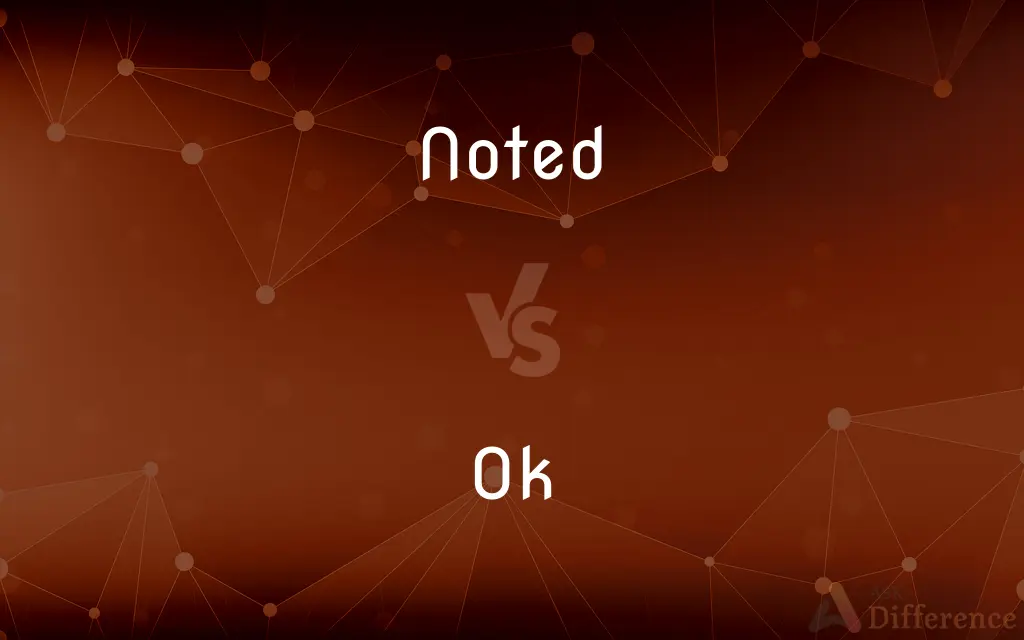Noted vs. Ok — What's the Difference?
By Urooj Arif & Fiza Rafique — Updated on April 6, 2024
"Noted" implies acknowledgment with attention to detail, often used in formal contexts, while "OK" signifies general agreement or acceptance, more casual in tone.

Difference Between Noted and Ok
Table of Contents
ADVERTISEMENT
Key Differences
"Noted" is commonly used to convey that the information provided has been received and understood, with an implication that it will be remembered or acted upon if necessary. It suggests a level of formality and professionalism, indicating that the speaker is taking the information seriously. On the other hand, "OK" is a versatile expression that denotes agreement, acceptance, or acknowledgment without necessarily implying any intention to act on the information. It is informal and can be used in a wide range of situations, from casual conversations to informal emails.
In professional settings, "noted" can serve as an assurance that the speaker has not only acknowledged the information but also intends to consider it or follow up on it. It communicates attention to detail and a certain degree of responsibility towards the received information. Whereas "OK" in such contexts might be seen as a less engaged response, indicating basic acknowledgment without the same level of commitment to action or attention.
When receiving instructions or feedback, using "noted" can be a way to show respect and that the speaker values the information provided, possibly preparing to integrate it into their work or decisions. In contrast, "OK" might come across as more passive or non-committal, suitable for less formal interactions where the stakes are not as high, or the information is not critical.
The choice between "noted" and "OK" can also reflect the relationship between the parties involved. "Noted" might be preferred in communications where hierarchy, such as in workplace emails, requires a show of deference or professionalism. "OK", being more casual and relaxed, might be chosen among peers or in situations where formality is not a priority.
Despite their differences, both "noted" and "OK" are effective in acknowledging the reception of a message. The choice between the two largely depends on the context, the nature of the relationship between the communicators, and the desired level of formality or engagement.
ADVERTISEMENT
Comparison Chart
Tone
Formal, implies careful attention and consideration.
Informal, general acceptance or agreement.
Context
Professional settings, where acknowledgment with intention is needed.
Casual or informal situations, and some less formal professional cases.
Implication
Suggests action or attention will be taken based on the information.
Indicates acceptance without a strong implication of further action.
Suitability
Preferred in formal communications or when responding to instructions.
Suitable for everyday conversations and informal communications.
Relationship Dynamics
Often used in hierarchical or professional relationships.
Common among equals or in relaxed settings.
Compare with Definitions
Noted
Used to confirm understanding and receipt in a formal manner.
Noted. I'll make the necessary adjustments to the report.
Ok
Can denote satisfactory but not exceptional acceptance.
The design is OK, but it could use some more work.
Noted
Signifies recording or remembering information for future reference.
Your preferences have been noted for your next visit.
Ok
Used to express acceptance, often casually.
OK, that sounds good to me.
Noted
Acknowledged with attention to detail, often with an intent to act upon.
Your feedback has been noted, and we will address the issue promptly.
Ok
Signifies readiness or to proceed with something.
OK, let's start the presentation.
Noted
Implies a level of professionalism in response to information received.
All your concerns are noted; we will revisit our strategy accordingly.
Ok
Indicates compliance or consent without detailed engagement.
OK, go ahead and order the pizza for dinner.
Noted
Conveys taking information seriously in professional settings.
The deadline changes are noted, and the team will be informed.
Ok
General acknowledgment or agreement, versatile in use.
OK, I'll see you at 3 PM for the meeting.
Noted
Well known; famous
A noted patron of the arts
The restaurant is noted for its high standards of cuisine
Ok
Used to express agreement or acceptance
OK, I'll pass on your message
OK, OK, I give in
Noted
Widely known or distinguished, as by reputation; famous
A noted physician.
A political campaign noted for its mudslinging.
Ok
Satisfactory but not especially good
The flight was OK
Noted
Well known because of one's reputation; famous, celebrated.
Ok
In a satisfactory manner or to a satisfactory extent
The computer continues to work OK
Noted
Simple past tense and past participle of note
Ok
An authorization or approval
The officer gave me the OK
Noted
Well known by reputation or report; eminent; famous; prominent; celebrated; as, a noted author, or traveler.
Ok
Give approval to
Despite objections, the committee ok'd the construction
Noted
Widely known and esteemed;
A famous actor
A celebrated musician
A famed scientist
An illustrious judge
A notable historian
A renowned painter
Ok
Satisfactory or agreeable; acceptable
Was everything OK with your stay?.
Noted
Worthy of notice or attention;
A noted increase in the crime rate
Ok
Correct
That answer is OK.
Ok
Barely satisfactory; mediocre
Made an OK presentation.
Ok
In proper or satisfactory operational or working order
Is the battery OK?.
Ok
Uninjured or not seriously injured
The skier fell but was OK.
Ok
Fairly healthy
Thanks to the medicine, the patient is OK now.
Ok
Approval; agreement
Get your supervisor's OK before taking a day off.
Ok
Fine; well enough; adequately
A television that works OK despite its age.
Ok
Used to express approval or agreement.
Ok
To approve of or agree to; authorize.
Ok
(informal) OK
Ok
A state in south central United States
Ok
An endorsement;
They gave us the O.K. to go ahead
Ok
Being satisfactory or in satisfactory condition;
An all-right movie
The passengers were shaken up but are all right
Is everything all right?
Everything's fine
Things are okay
Dinner and the movies had been fine
Another minute I'd have been fine
Ok
Sentence-initial expression of agreement
Common Curiosities
Is "noted" always better to use than "OK" in professional settings?
While "noted" is often more appropriate in formal communications, "OK" can be suitable in less formal exchanges or among colleagues who regularly interact in a casual manner.
Why might someone choose to use "noted" instead of "OK"?
Choosing "noted" over "OK" can convey a higher level of engagement with the information received, indicating that it will be taken into consideration or acted upon.
Is it appropriate to use "OK" in emails?
"OK" can be appropriate in emails, particularly in less formal contexts or when responding to peers, but using "noted" might be better in more formal or professional exchanges.
How can one decide which response to use in a given situation?
Considering the formality of the setting, the nature of the message, and the relationship with the recipient can help determine the most appropriate response.
Can "OK" be perceived as rude or dismissive?
Depending on the context and tone, "OK" might be seen as dismissive, especially if the situation calls for a more engaged or thoughtful response.
How can the choice between "noted" and "OK" affect communication?
The choice can influence the perceived level of professionalism, engagement, and respect in communication, potentially affecting the relationship and expectations between the parties involved.
How do cultural differences impact the use of "noted" and "OK"?
Cultural norms can influence the perceived appropriateness and interpretation of responses, with some cultures favoring more formal acknowledgments and others valuing brevity and informality.
Can "noted" ever come across as too formal or cold?
In some contexts, especially casual or personal communications, "noted" might be perceived as overly formal or distancing, suggesting a lack of warmth or personal connection.
Are there situations where both "noted" and "OK" are equally appropriate?
Yes, in some professional contexts that are not strictly formal, both responses might be acceptable, depending on the relationship between the parties and the nature of the communication.
What are the nuances in tone between "noted" and "OK"?
"Noted" carries a tone of attentiveness and consideration, while "OK" is more neutral, signaling general agreement or readiness without implying further engagement.
Share Your Discovery

Previous Comparison
Artful vs. Artistic
Next Comparison
Simple vs. SimpletonAuthor Spotlight
Written by
Urooj ArifUrooj is a skilled content writer at Ask Difference, known for her exceptional ability to simplify complex topics into engaging and informative content. With a passion for research and a flair for clear, concise writing, she consistently delivers articles that resonate with our diverse audience.
Co-written by
Fiza RafiqueFiza Rafique is a skilled content writer at AskDifference.com, where she meticulously refines and enhances written pieces. Drawing from her vast editorial expertise, Fiza ensures clarity, accuracy, and precision in every article. Passionate about language, she continually seeks to elevate the quality of content for readers worldwide.
















































